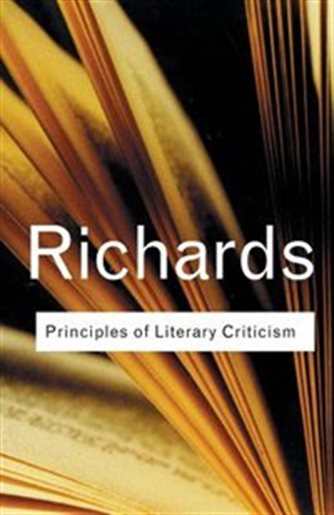
There is nothing worse than a glib thirty-year-old academic who has absolute confidence in the possibility of certainty. Reading Ivor Richards’ Principles of Literary Criticism, I was seized every five pages by an impulse to hurl the book at the wall. I resisted because the people from Routledge tell me this book is a modern classic. They’re joking of course. Either that or they mean something quite specific when they use the term “modern classic”. They can’t possibly mean “widely read and as fresh today as it was when it first hit the book shelves in 1924”. Instead, they must mean something like “influential, but otherwise only suitable for lit geeks.”
Principles of Literary Criticism is interesting to lit geeks the same way an ancient pot is interesting to an archaeologist. It tells us something about how we got to this place, but just as we’d never use a three thousand-year-old clay pot for cooking tonight’s casserole, so we’d never use Richards’ approach to make sense of a work of art we saw at Nuit Blanche or a poem by Christian Bök we heard on YouTube.
Richards creates the outline for an epistemology of aesthetics. To put that a little more intelligibly, Richards thinks that what counts in our assessment of art is the experience we have of an object in terms of its value as a beautiful object, an experience which belongs not to the object itself but to the workings of our mind. To make this fly, Richards sets out several preliminary steps:
1. A theory of value as it relates to aesthetic judgment. He argues that there must an objective basis for valuing one work of art more highly than another. If we can articulate the principles for making such valuations, then we can apply them fearlessly in any situation. His preface opens with “A book is a machine to think with …”, a metaphor he revisits in the book’s final paragraph. By implication, he envisages his book as a machine for determining what makes one work of art good and another bad.
2. An epistemology grounded in human psychology. Richards believes in a science of the mind. He anticipates the work of Bernard Lonergan (Insight) who claimed that there is an “invariant structure of human knowing” which can be worked out in close detail. If people cannot help but receive and process information in a particular way, then it becomes easy to predict how people will apprehend information of a specific sort (e.g. aesthetic information). “All modern aesthetics rests upon an assumption … that there is a distinct kind of mental activity present in what are called aesthetic experiences.”
3. A theory of communication that explains the transmission of experience from artist to critic/audience/reader. Richards claims that communication is dependent upon the common experience of the communicating parties. We use the commonality of our experience as a way to verify the commonality of the meanings we ascribe to the words we use. Communication doesn’t depend upon an exact correspondence between experiences, since that would be impossible, but upon a set of experiences or experiences which fall within a given range. For this reason, Richards says that good poets are invariably “normal” (at which point the book hits the wall). Richards also believes that poetry is a higher form of communication because it is more complex than prose and so it is able to support a richer range of experience. If we rely on his prose for our model, then he’s absolutely correct.
A consequence of Richards’ formalism is that it demystifies the poetic experience. It’s no surprise, then, that Richards has no use for religion, which has suffered an analogous demystification:
A false belief may become an indispensable condition for the most important activities of individuals who without it break down into confusion. So it is with many religious beliefs; and in saying that the removal of such beliefs need involve no loss, and may involve great gains in values, we do not say that there are not certain individuals whose values will be destroyed in the process. We say only that adaptable people will find that most of their values can be retained after rejecting their errors, that compensations and equivalents for their losses are available, and that whole sets of fresh values become open to them through their better adjustment to the actual world in which they live.
It’s unsurprising too that he gives priority to science as a method of knowing. While there have been other critical movements in the years intervening since Richards’ writings laid the groundwork for New Criticism (most notably the Critical Theory movement) nevertheless the demystification of poetry has stuck, maybe because Critical Theory relies upon an alternative epistemology without seriously questioning whether poetry ought to be treated as knowledge/information in the first instance, or maybe because of a more general cultural movement which has swept up religion and poetry into the same irrelevant basket.
It leaves me wondering why a man would make a career of providing literary exegesis using a hermeneutic that contributes to the destruction of the very thing he seeks to understand. He reminds me of the entomologist whose knowledge of insects is restricted to the specimens he has pinned to boards in his office.